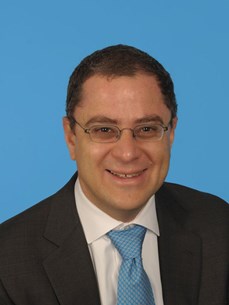Meeting
2024 ASCO Annual Meeting

Memorial Sloan Kettering Cancer Center, Weill Medical College at Cornell University, Trinity College Dublin, New York, NY
Ghassan K. Abou-Alfa , Chang-Fang Chiu , Fabio Piscaglia , Bruno Sangro , Anne Henkel , Hua Fang , Maulik Patel , Zhihong Ping , Claire Sutherland , Emarjola Bako , Cristiano Ferlini
Background: Patients (pts) with hepatocellular carcinoma (HCC) often present with unresectable advanced/metastatic disease and have a poor prognosis. Gene expression profiles of HCC tumors suggest transforming growth factor (TGF)-β signaling as a possible mechanism of immune escape. First-in-class monoclonal antibody (mAb) livmoniplimab (livmo; ABBV-151) targets the GARP–TGF-β1 complex and prevents release of active TGF-β1. Budigalimab (budi) is an anti–PD-1 immune checkpoint inhibitor (ICI) mAb. Promising clinical activity was seen with livmo + budi in a phase 1 study (NCT03821935); overall response rate=42% (5/12; n=4 per RECIST v1.1, n=5 per iRECIST) in pts with advanced HCC that progressed on/after a first-line (1L) systemic therapy not including a PD-1/PD-L1 inhibitor. Approved ICI combinations have low response rates of ~20–30% in pts with 1L HCC; most will eventually experience relapse and require additional treatment options. This phase 2 trial will investigate dosing, safety, and efficacy of livmo + budi in pts with locally advanced/metastatic HCC that progressed after a 1L ICI-containing regimen. Methods: This open-label, randomized study (EU CT: 2022-502948-13-00) will enroll pts ≥18 years with locally advanced/metastatic HCC, evaluable or measurable disease per RECIST v1.1, Child-Pugh A, ECOG PS ≤1, who experienced failure of an ICI-containing regimen in 1L HCC and completed a ≥28-day washout period for prior systemic treatment. Pts with active/untreated central nervous system metastases will be excluded. Primary objectives include identifying the optimal livmo dose in combination with budi and determining the recommended phase 3 dose (RP3D), and evaluating efficacy (best overall response rate) of livmo + budi. Secondary and exploratory objectives are to evaluate efficacy (duration of response, progression-free survival, overall survival), safety, tolerability, immunogenicity, pharmacokinetics/pharmacodynamics (PK/PD), predictive biomarkers, and pt-reported symptoms and tolerability. Pts (n=120) will be randomized 1:1:1 to receive 400mg sorafenib BID/8-12mg lenvatinib QD orally (control; investigator choice), low- or high-dose IV livmo (selected based on mode of action, clinical efficacy and safety, and clinical PK/PD modeling) + IV budi Q3W in 21-day cycles. Pts will be treated until confirmed disease progression, other discontinuation criteria are met, or for 2 years (whichever comes first). A nonbinding futility interim analysis will be conducted after 60 pts (20 per cohort) are enrolled and had ≥2 tumor assessments, a primary analysis at ≥4 months after first dosing of the last enrolled pt, and the final analysis at completion of a 90-day safety follow-up after ≤2 years of study treatment. The RP3D for livmo will be selected based on all available preclinical and clinical data. Enrollment began in July 2023 and up to 60 sites in ~7 countries will be included. Clinical trial information: 2022-502948-13-00.
Disclaimer
This material on this page is ©2024 American Society of Clinical Oncology, all rights reserved. Licensing available upon request. For more information, please contact licensing@asco.org
2024 ASCO Annual Meeting
Poster Session
Gastrointestinal Cancer—Gastroesophageal, Pancreatic, and Hepatobiliary
Gastrointestinal Cancer—Gastroesophageal, Pancreatic, and Hepatobiliary
Hepatobiliary Cancer - Advanced/Metastatic Disease
2022-502948-13-00
J Clin Oncol 42, 2024 (suppl 16; abstr TPS4189)
10.1200/JCO.2024.42.16_suppl.TPS4189
TPS4189
164b
Abstract Disclosures
2024 ASCO Gastrointestinal Cancers Symposium
First Author: Roshini Pradeep
2022 ASCO Annual Meeting
First Author: Jie Zhao
2023 ASCO Gastrointestinal Cancers Symposium
First Author: Masafumi Ikeda
2023 ASCO Annual Meeting
First Author: Lorenza Rimassa